Imagine stepping into your backyard and being greeted by a vibrant tapestry of colorful flowers, lush greenery, and the soothing trickle of a water feature. Whether you’re nurturing a small patio or a sprawling lawn, outdoor gardening ideas can turn your space into a personal paradise. From growing your own vegetables to creating a haven for pollinators, gardening offers endless ways to enhance your home’s beauty and functionality. This guide dives into 15 creative outdoor gardening ideas to inspire you, offering practical tips to craft a stunning, sustainable outdoor oasis that thrives year-round.
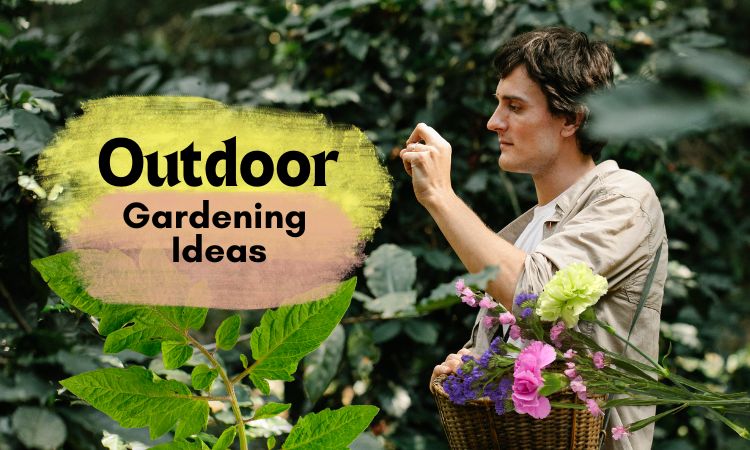
Why Outdoor Gardening Matters
Outdoor gardening transforms your yard into more than just a patch of grass, it’s a space for relaxation, creativity, and connection with nature. Gardening boosts mental health, supports local ecosystems, and can even increase your property’s value by up to 15%, according to recent studies. With the right outdoor gardening ideas, you can design a space that’s both visually striking and environmentally friendly, tailored to your lifestyle and space.
15 Outdoor Gardening Ideas to Elevate Your Space
Below are 15 innovative outdoor gardening ideas to suit various spaces, budgets, and skill levels, each with actionable steps to bring your vision to life.
1. Vertical Gardens for Small Spaces
Maximize limited space by growing plants upward on walls, fences, or trellises, adding greenery without sacrificing ground area.
- How to do it: Install wall-mounted planters, stackable pots, or a repurposed wooden pallet. Grow herbs, succulents, or trailing vines.
- Best plants: Ferns, pothos, strawberries, or lettuce.
- Tip: Ensure proper drainage to protect structures from water damage.
2. Raised Garden Beds for Easy Maintenance
Raised beds improve soil control and reduce physical strain, making them ideal for vegetables, herbs, or flowers.
- How to do it: Construct beds from wood or metal, 12–18 inches high, filled with a blend of compost, topsoil, and peat moss.
- Best plants: Tomatoes, carrots, zinnias, or basil.
- Tip: Add drip irrigation for consistent, low-effort watering.
3. Pollinator-Friendly Gardens
Support bees, butterflies, and birds with a garden designed to attract pollinators, a top trend among outdoor gardening ideas.
- How to do it: Plant native flowers like coneflowers, milkweed, or lavender in clusters to draw pollinators.
- Best plants: Bee balm, black-eyed Susan, or butterfly bush.
- Tip: Skip pesticides and add a shallow birdbath for water.
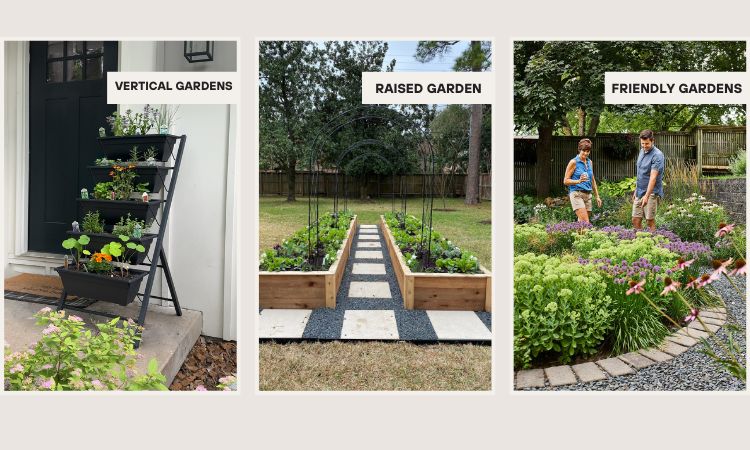
4. Edible Landscaping
Combine beauty and utility by integrating edible plants into your landscape design.
- How to do it: Swap ornamental shrubs for blueberry bushes or use kale as a decorative border.
- Best plants: Dwarf apple trees, rosemary, or Swiss chard.
- Tip: Pair edibles with flowers for a vibrant, productive garden.
5. Container Gardening for Flexibility
Containers allow you to move plants to optimize sunlight or enhance aesthetics, perfect for renters or small spaces.
- How to do it: Use pots, barrels, or recycled containers with drainage holes. Group them for a layered effect.
- Best plants: Petunias, cherry tomatoes, or dwarf citrus.
- Tip: Choose lightweight, weather-resistant pots for mobility.
6. Water Features with Aquatic Plants
Create a serene focal point with a small pond or fountain surrounded by aquatic plants.
- How to do it: Install a pre-formed pond or use a large container. Add water lilies or lotus for elegance.
- Best plants: Water hyacinth, cattails, or pickerelweed.
- Tip: Use a pump to circulate water and prevent mosquito breeding.
7. Native Plant Gardens
Native plants are low-maintenance, drought-tolerant, and support local wildlife, making them a sustainable outdoor gardening idea.
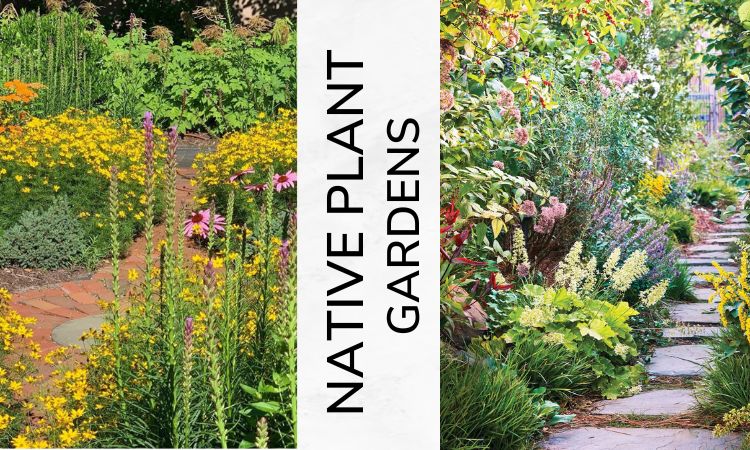
- How to do it: Research region-specific plants via local extension services. Plant in naturalized groupings.
- Best plants: Examples include California poppy (West) or cardinal flower (East).
- Tip: Check USDA Hardiness Zones for plant compatibility.
8. Herb Spiral for Space-Saving Flavor
An herb spiral is a compact, visually appealing way to grow herbs with different water and light needs.
- How to do it: Build a spiral mound with stones or bricks, placing drainage-loving herbs at the top.
- Best plants: Thyme (top), basil (middle), cilantro (bottom).
- Tip: Position in full sun for optimal herb growth.
9. Pergola or Trellis with Climbing Plants
Add shade and charm with a pergola or trellis covered in climbing plants.
- How to do it: Install a wooden or metal structure and train vines like clematis or grapes to climb.
- Best plants: Wisteria, climbing roses, or honeysuckle.
- Tip: Prune regularly to manage growth and maintain structure.
10. Moonlight Garden for Evening Ambiance
A moonlight garden features white or light-colored flowers that glow under moonlight, ideal for evening enjoyment.
- How to do it: Plant white flowers and silver-foliaged plants in a shaded area with evening access.
- Best plants: Moonflower, white impatiens, or lamb’s ear.
- Tip: Add solar lights to enhance the nighttime effect.
11. Succulent Rock Garden
Create a low-maintenance, drought-tolerant rock garden with succulents for texture and color.
- How to do it: Arrange rocks and gravel, then plant succulents in clusters with well-draining soil.
- Best plants: Echeveria, sedum, or hens-and-chicks.
- Tip: Mulch with pebbles to retain moisture and deter weeds.
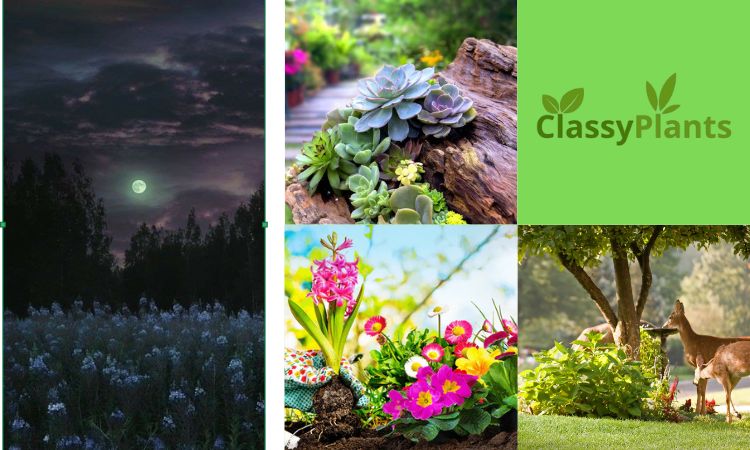
12. Wildlife Habitat Garden
Design a garden to attract birds, insects, and small animals, supporting biodiversity.
- How to do it: Include berry-producing shrubs, a bird feeder, and a water feature.
- Best plants: Serviceberry, holly, or sunflowers.
- Tip: Avoid invasive plants that disrupt local ecosystems.
13. Seasonal Flower Beds
Keep your garden colorful year-round with rotating seasonal flowers.
- How to do it: Plan beds with spring (tulips), summer (zinnias), and fall (chrysanthemums) blooms.
- Best plants: Pansies (spring), marigolds (summer), asters (fall).
- Tip: Deadhead spent flowers to encourage continuous blooming.
14. Outdoor Kitchen Garden
Grow fresh ingredients near your patio or outdoor kitchen for convenience and flavor.
- How to do it: Plant herbs, salad greens, and compact vegetables in raised beds or pots near your cooking area.
- Best plants: Mint, cherry tomatoes, or arugula.
- Tip: Use companion planting (e.g., marigolds with tomatoes) to deter pests.
15. Eco-Friendly Rain Garden
Capture rainwater and reduce runoff with a rain garden, a sustainable outdoor gardening idea.
- How to do it: Dig a shallow basin in a low-lying area and plant water-tolerant species.
- Best plants: Blue flag iris, switchgrass, or Joe-Pye weed.
- Tip: Check local drainage regulations before starting.
Planning Your Outdoor Garden
To make the most of these outdoor gardening ideas, follow these planning steps:
- Assess your space: Measure your yard and note sunlight, shade, and soil conditions.
- Know your climate: Use your USDA Hardiness Zone to select plants suited to your region.
- Set a budget: Start with affordable projects like container gardening or propagating cuttings.
- Test soil: Conduct a soil test to check pH and nutrient levels. Most plants prefer slightly acidic soil (pH 6.0–7.0).
| Garden Type | Space Needed | Maintenance Level | Best For |
|---|---|---|---|
| Vertical Garden | Small (walls, fences) | Low | Urban spaces, apartments |
| Raised Beds | Medium (4×4 ft) | Medium | Vegetables, flowers |
| Pollinator Garden | Medium-large | Low | Eco-conscious gardeners |
| Container Garden | Small-medium | Low | Beginners, renters |
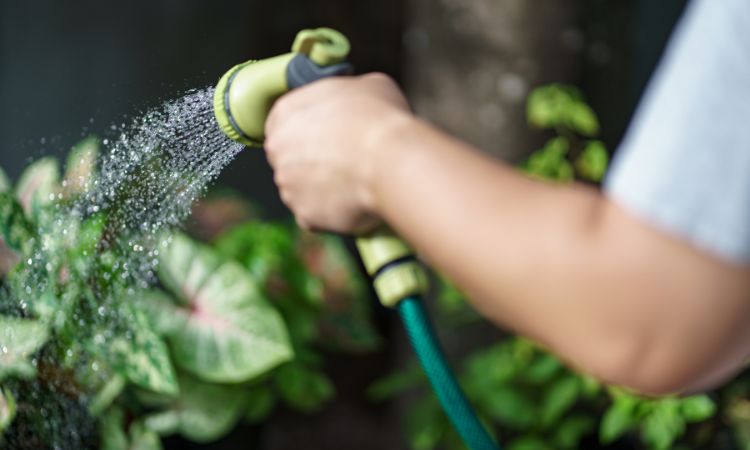
Tools and Materials for Success
Equip yourself with these essentials to bring your outdoor gardening ideas to life:
- Basic tools: Trowel, pruners, gloves, shovel, and a watering can or hose.
- Soil amendments: Compost, organic fertilizer, or perlite for improved drainage.
- Mulch: Wood chips, straw, or gravel to retain moisture and suppress weeds.
- Irrigation: Drip systems or soaker hoses for efficient, water-saving irrigation.
Common Mistakes to Avoid
Steer clear of these pitfalls to ensure your garden thrives:
- Overplanting: Crowded plants compete for light, water, and nutrients.
- Ignoring soil health: Poor soil leads to weak plants. Test and amend soil regularly.
- Neglecting maintenance: Regular watering, pruning, and weeding keep your garden healthy.
- Wrong plant choices: Select species suited to your climate, light, and soil conditions.
Sustainable Practices for Outdoor Gardening
Sustainability is a cornerstone of modern gardening in 2025. Adopt these eco-friendly practices:
- Composting: Turn kitchen scraps and yard waste into nutrient-rich soil.
- Water conservation: Use rain barrels, xeriscaping, or drought-tolerant plants to save water.
- Organic pest control: Organic pest control for neem oil, companion planting, or beneficial insects instead of chemical pesticides.
- Native plants: They require less water and maintenance while supporting pollinators and wildlife.
Long-Term Care for a Thriving Garden
To maintain a vibrant outdoor garden:
- Watering: Water deeply but infrequently, ideally in the morning, to encourage strong roots.
- Fertilizing: Apply a balanced fertilizer (e.g., 10-10-10 NPK) during spring and summer.
- Pruning: Trim dead or overgrown branches to promote healthy growth and shape.
- Seasonal cleanup: Clear debris in fall to prevent pests and diseases in winter.
Advanced Tips for Outdoor Gardening Success
For gardeners ready to take their outdoor gardening ideas to the next level:
- Companion planting: Pair plants like basil with tomatoes to enhance growth and deter pests.
- Soil layering: Use lasagna gardening (layering compost, cardboard, and soil) to build rich beds over time.
- Smart technology: Install soil moisture sensors or automated irrigation for precise care.
- Crop rotation: Rotate vegetable crops annually to prevent soil depletion and disease buildup.
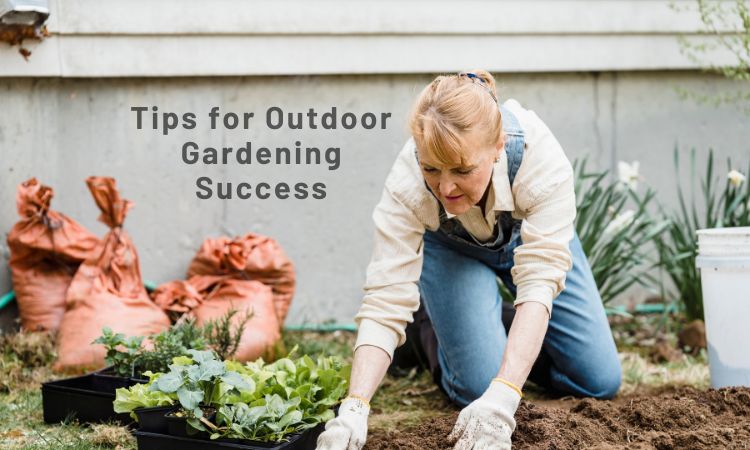
Troubleshooting Common Gardening Challenges
Gardening comes with challenges, but these solutions can help:
- Pests: Use neem oil or introduce ladybugs for aphids and spider mites.
- Poor drainage: Add perlite or sand to soil, or elevate beds to prevent waterlogging.
- Weeds: Mulch heavily and pull weeds early to reduce competition.
- Plant stress: Ensure proper light, water, and nutrients; avoid sudden environmental changes.
FAQs About Outdoor Gardening Ideas
Container gardening, raised beds, and herb spirals are easy, low-maintenance options that offer flexibility and quick results.
Use native plants, compost, rain gardens, and organic pest control to minimize environmental impact and support local ecosystems.
Marigolds, succulents, and herbs like basil or mint are low-maintenance and adaptable to various climates.
Maintenance varies: container gardens need 1–2 hours weekly, while larger beds or pollinator gardens may require 3–5 hours.
Yes! Use recycled containers, propagate plants from cuttings, make compost, and start with affordable seeds or seedlings.
Conclusion
With these 15 outdoor gardening ideas, you can transform your backyard into a stunning, functional oasis that reflects your style and values. Whether you’re growing fresh herbs, attracting butterflies, or building a serene water garden, there’s an idea for every space and skill level. By planning carefully, choosing plants suited to your climate, and embracing sustainable practices, you’ll create a thriving garden that enhances your home and supports the environment. Start exploring these outdoor gardening ideas today, and watch your outdoor space bloom into a vibrant retreat!